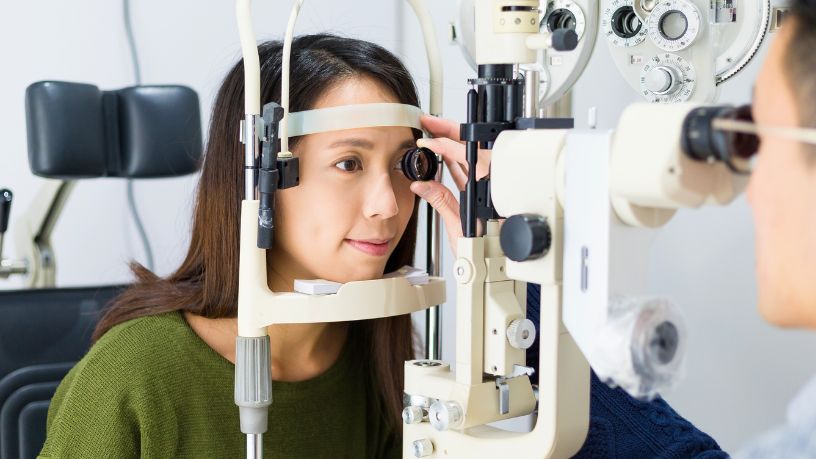Routine eye checks can detect more than just vision or eye health problems.
On this page
Key takeaways
Blood vessels in the eyes can indicate signs of some serious health conditions, including diabetes and heart disease.
Early detection of chronic health issues can be the key to improved health outcomes. Speak to your optometrist for more information.
Did you know that some serious health conditions (including diabetes, heart disease and some cancers) can be detected through a routine eye test?
What the eye can reveal about your health
Looking into the eyes is one of the easiest and least invasive ways to get a snapshot of your health, says Karen Makin, Head Optometrist at Bupa Optical and Hearing.
"The eyes are the only organ in the body where we can view blood vessels directly without cutting somebody open. It's a really easy way to get a lot of information."
One of the primary things an eyecare practitioner might look for when examining the eyes is changes in the retina, such as leaking or haemorrhaging of the blood vessels.
"These changes can indicate the presence of high blood pressure or systemic disease, such as cardiovascular disease," says Makin. "I've also seen people with a white ring around the coloured part of the eye or cholesterol deposits on the eye lids, both of which may suggest high cholesterol, another risk factor for heart disease."
Your free Microvascular Health Assessment
A Microvascular Health Assessment (MHA) uses AI to predict the risk of developing cardiovascular disease within the next 5 years. MHA is now free for current Bupa Members aged 40 to 80 and can be added to your regular eye test.
Symptoms of diabetes can also present in the eyes.
Sometimes the first indication a person has that they might have diabetes can be a change in vision.
"We would be looking for changes in the back of the eye and bleeding of the retinal blood vessels."
Even some cancers can be detected simply by looking in the eyes.
"Some more common ones that we might see are basal cell carcinomas. Other types of cancer, such as malignant melanomas, can develop in the eye. You can also get eye cancers on the white of the eye or on the iris, so we would be looking out for those."
When to get an eye test
Global recommendations are that healthy adults should get a routine eye check every 2 years.
"If you have any chronic health issues, such as diabetes, or a family history of glaucoma, your optometrist may say once a year is preferable," says Makin. "Age is a risk factor for many eye conditions and health issues, including heart disease, so after the age of 40 I'd suggest getting a routine eye check every year."
If you experience any changes in your vision, such as vision loss, blurring, flashes or floaters, you should see your optometrist immediately. As well as eye conditions, these symptoms can also indicate other health problems.
“It’s important to note that these conditions may be present in the body but not show up in the eyes at all,” says Makin. “As we age, staying on top of all annual health tests, such as mammograms, bowel cancer screenings and heart health checks, will help detect early stages of any condition that may require treatment.”
The type of eye test you get may also change with age, says Makin.
“We might not do a pressure check in young children and we’re not looking for eye conditions related to ageing such as glaucoma, so instead we focus more on vision and colour tests. With adults we might add in certain tests such as dilating pupils so we can see more of the eye and other tests that can identify common eye ageing issues. It’s good to flag any concerns or family history if your optometrist doesn’t ask so they know what to look out for.”What health conditions can show up in the eyes?
According to the American Academy of Ophthalmology, more than 20 health conditions can be detected during an eye test.1 These include:
- aneurysm
- brain tumour
- cancers of the blood, tissue or skin
- diabetes
- giant cell arteritis
- heart disease
- high blood pressure
- high cholesterol
- lupus
- Lyme disease
- multiple sclerosis
- myasthenia gravis
- rheumatoid arthritis
- sarcoidosis
- sexually transmitted diseases
- sickle cell disease
- Sjogren's syndrome
- stroke
- thyroid disease
- vascular disease
- vitamin A deficiency.
See your healthcare practitioner if you're worried about any of the conditions listed and flag any family history with your optometrist at your next appointment.
Book an eye test
Find and book your preferred spot at your local Bupa Optical store.

At Bupa, trust is everything
Our health and wellbeing information is regularly reviewed and maintained by a team of healthcare experts, to ensure its relevancy and accuracy. Everyone's health journey is unique and health outcomes vary from person to person.
This content is not a replacement for personalised and specific medical, healthcare, or other professional advice. If you have concerns about your health, see your doctor or other health professional.
1Mukamal, R. (2024). 20 Surprising Health Problems an Eye Exam Can Catch. American Academy of Ophthalmology.
You might also like...
Eye checks: A health essential
Getting to the optometrist every 2 years might not always be at the top of your mind, but did you know an eye check can detect more than just vision loss?
Health checks and screening at every stage of life
It’s important to make sure you get the right health checks throughout your life, from your 20s to your 50s and beyond. Check out our guide to learn more.
Heart health check: The 20-minute test that could save your life
Heart disease is a leading cause of death in Australia. Booking in for a heart health check could help you identify your risks and save your life.
Eye tests: A window to your heart health
Are you getting your eyes checked regularly? Find out how a routine eye test could help detect risk factors for heart disease.





